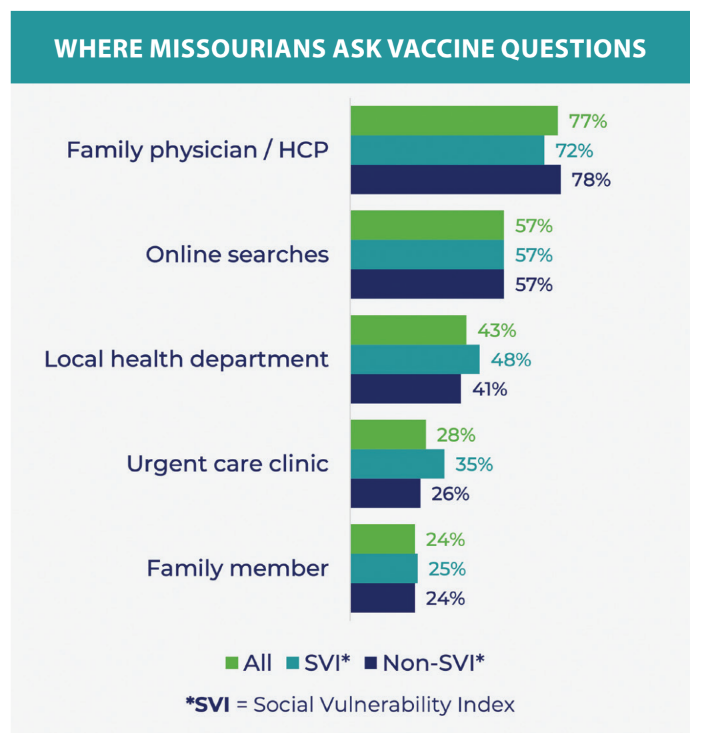Health Care Providers Are Most Trusted Source of Vaccine Information
DHSS survey of Missouri residents, parents and providers shows vaccine acceptance has become more challenging since the pandemic
From St. Louis Metropolitan Medicine, First Quarter 2024
By Lana Hudanick, RN, MPH
Talking with patients about vaccines isn’t easy. Combatting misinformation, calming anxieties, and keeping updated on the latest information is all in a day’s work. New research on vaccine awareness and confidence in Missouri from the Missouri Department of Health and Senior Services (DHSS) reveals insights and informs strategies providers can use to have more effective vaccine conversations. The study examined perceptions of vaccines and behaviors related to vaccine acceptance from two perspectives: Missouri residents and health care providers (HCPs).
Research with Missourians included surveying 950 residents statewide and hosting 11 focus groups with residents, including parents, those who identified as Black/African American and Hispanic/Latino/Latinx, and those in rural or high social vulnerability index regions, along with other demographics. Missouri HCP research included in-depth interviews and an online survey of 242 HCPs across the state. HCPs included physicians, physician assistants, nurse practitioners, nurses and pharmacists.
When viewed together, the results from both residents and HCPs present a compelling picture of the state of vaccines and discussion about vaccines in Missouri.
Trust in Health Care Providers
 Eight of ten Missouri residents surveyed said HCPs are their most trusted resource for vaccines and the source they turn to most for questions about vaccines. Similarly, eight in ten Missouri residents were comfortable discussing vaccines with HCPs. These providers were also the most cited source for vaccine questions, followed by online searches and local public health departments.
Eight of ten Missouri residents surveyed said HCPs are their most trusted resource for vaccines and the source they turn to most for questions about vaccines. Similarly, eight in ten Missouri residents were comfortable discussing vaccines with HCPs. These providers were also the most cited source for vaccine questions, followed by online searches and local public health departments.
However, levels of trust and comfort varied by demographic and geographic location. Parents of minors were twice as likely to have little or no trust in their HCPs than non-parents. Residents identifying as Black/African American, Hispanic/ Latinx, and all other ethnicities also reported lower trust in HCPs than those identifying as white.
Residents identifying as Black/African American and Hispanic/Latinx felt less comfortable discussing vaccines than residents identifying with other racial/ethnic groups. Those in high social vulnerability index counties were also less likely to feel comfortable discussing vaccines with HCPs than residents in low social vulnerability index counties.
Concerns About Safety, Side Effects, Efficacy
Nearly all Missourians who participated in the study got themselves and their children vaccinated, and 60% saw vaccines as important, especially long-standing, routine vaccines. Two out of three residents said they were “up-to-date or mostly up-to-date” on their vaccines, while eight out of ten parents said the same for their children.
However, at least half of Missouri residents in the study had concerns about vaccine safety or side effects. A third were unsure or disagreed that vaccines are the easiest way to protect yourself and your family. Said a resident who declined vaccination: “[I] didn’t feel safe taking the vaccine because I had no idea what it could do to me currently or down the line … there was a lot of information but not the information I needed.”
These concerns were more common for those in high social vulnerability index counties, those in rural areas, and those identifying as Black/African American. Those identifying as Hispanic/Latinx were the most likely of any racial/ethnic group to say vaccines are unsafe. Parents of minors were less likely to agree vaccines are safe and more likely to have concerns about side effects than non-parents. They were also less likely to believe vaccines are the easiest way to prevent illness.
Frequency of Vaccine Conversations
To capture all opportunities to vaccinate and to reinforce the importance of vaccines, the CDC recommends HCPs review vaccine status at every patient visit.1 However, the research showed Missouri HCPs and patients have differing perspectives on how often vaccine conversations occur.
Only one in five residents, or 20%, reported talking frequently (at most or all appointments) with their HCPs about vaccines. The majority of residents said they only discussed vaccines with their HCPs when they had questions or concerns or if the HCP brought up the topic. In contrast, nearly three out of four HCPs reported discussing vaccines with patients at least once daily. Roughly half reported discussing them two or more times a day. However, only one in five HCPs said they bring up vaccines at every appointment.
Vaccine Counseling in the Post-Pandemic Environment
When asked if they noticed a change over the past two years in how patients respond to vaccine conversations, 60% of providers said patients have become less receptive to these discussions. They noted patients are more skeptical and less trusting of HCP expertise and vaccine safety and efficacy.
Sixty-eight percent of HCPs shared concerns about having these conversations due to patients’ political views, patients’ mistrust of vaccine manufacturers, and their own fear of alienating the provider-patient relationship, among other reasons.
Given the varying levels of trust and comfort in discussing vaccines, HCPs indicated they feel patients have become less receptive to those discussions. Fortunately, thoughts from Missouri residents on the overall tone of vaccine conversations offers some explanation. Missourians felt public trust in vaccines has declined due to COVID-19 vaccine rollouts. Fifty percent said vaccine conversations in general have become more negative. As a result, Missourians had mixed feelings on whether to vaccinate, and they are more vocal in expressing these views.
Effective Communication Strategies
Most HCPs reported handling vaccine conversations in the same way as they did before the COVID-19 pandemic. Around a fifth have shifted their approach. While the research did not prove one way was better than another, it did offer insights on how to have more effective discussions with patients. HCPs shared the following strategies:
- Normalize vaccines as standard of care. Though vaccine counseling competes with many other clinical priorities, discussing vaccines at every appointment can help reinforce their importance. One HCP shared an example of working vaccines into an appointment for other issues: “If [the patient] was in for a sprained ankle or an abscess, I may pull their record and say, ‘While you’re here today, let’s get these shots done.’”
- Use an empathetic, patient-centered approach. This means listening to the patient’s concerns in an open-minded and non-judgmental way, providing information, and supporting the patient in their decision, whatever they choose. An example: “Today your child is recommended to receive Tdap, HPV, and Men ACWY vaccines. What questions do you have for me? I hear your concerns about the safety of the HPV vaccine.” Dismissing patient questions and concerns can cause further division.
- Respect personal choice. Personal choice emerged as a consistent theme among Missouri residents. They don’t want to feel pressured or forced. They fear being judged, criticized, or belittled. They want their HCPs to listen and acknowledge their right to make informed decisions. An example: “I understand you have concerns regarding this vaccine. Is it okay to share with you the information I learned when researching these vaccines?
While concerns about safety, side effects, and efficacy— combined with increased negative sentiment towards vaccines—can make for difficult conversations, the research showed Missourians think vaccines are important and want to discuss vaccines with their doctors. While providers encounter many barriers to effective vaccine conversations, an empathetic, patient-centered approach can diffuse tension and make it easier to talk about vaccines with every patient at every visit. v
DHSS will be presenting this research at the Missouri Immunization Conference in Columbia, April 25-26. For more information on the conference, visit moimmunize.org.
Lana Hudanick, RN, MPH, is nurse manager for the Missouri Department of Health & Senior Services.
Reference
- Foster Support for Vaccination in Your Practice. Centers for Disease Control and Prevention website. https://www.cdc.gov/vaccines/hcp/conversations/your-practice. html (Accessed February 5, 2024).



